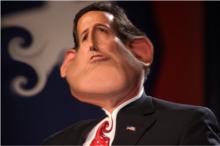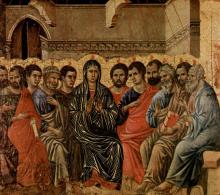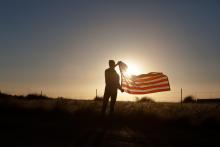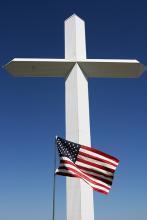Faith and Politics

The results of the Iowa Caucus are in. Romney edged it out with 8 votes over Santorum. Ron Paul came in third and then Gingrich, Perry and Bachmann came in fourth, fifth and sixth respectively.
It’s a stretch, but remember when Bachmann was the candidate to beat? How about Perry? Cain? Gingrich was just a few weeks ago. Ron Paul was at the top of the polls for a moment Iowa.
Santorum has now shot up in prominence with his close second finish but some observers are arguing that the only reason why he is up is that he hasn’t been vetted yet. (On Wednesday, "Rick Santorum" was the second-most popular search on Google after "Iowa caucus.")
Why all of the ups and downs?
After a poor performance last night’s Iowa Caucus — with a sixth place finish and only 6 percent of the evangelical vote — U.S. Rep. Michele Bachmann announced earlier today that she is suspending her campaign for President of the United States.
Watch video of her announcement inside...

The Rev. Pat Robertson. Bless his heart.
In an appearance on his 700 Club program Tuesday, while Iowans were heading to their caucuses, Robertson, the 1988 Iowa Caucus runner up, told viewers that he had a long conversation with the Almighty recently about the 2012 presidential election and the state of affairs in these United States of America (God bless it) in general.
Apparently, God told Robertson, 81, who the 45th President of the United States will be. But it's a secret.

For those who re-discover their faith by taking seriously the vision offered in the second chapter of the book of Acts, the Occupy movement may appear to them as the New Pentecost. Note the similarities between the ancient story and the contemporary movement:
- In Acts, the emergence of new power occurred when the “gossip” about the Resurrection became a life-empowering message that transcended all lingual differences: “each heard in his own language.” Likewise in Occupy Wall Street: in the development of a new means of communication, people of diverse backgrounds both spoke and heard in a common language. It was, indeed, a New Pentecost.
The Iowa Caucus is today and the nation is watching. It’s a lot of attention for a relatively small part of the nation voting. Having grown up in New Hampshire, I know that kind of limelight well.
When I was a pretentious 11 year old, I wasn’t able to vote but nonetheless assumed I had the right to meet every candidate who was seeking their party’s nomination. When President Bill Clinton came through the state I remember being particularly annoyed that he just drove by and waved instead of talking with me.
I still haven’t let that one go.
There are a lot of concerns about the undue influence early voting states wield in the primary process. The fact that I got more face time with candidates as an elementary school pupil than most voters will get in a lifetime is problematic.

In mid-December, the Religion Newswriters Association released its top 10 religion stories of the year.
The Associated Press now has its annual poll of U.S. editors and news directors and their choices for the top news stories of 2011.
Since this exercise is certainly a subjective one, your list might also be different from mine or the AP's. What would you add or delete from these lists?
It was not the stones thrown by his tormentors that made him suffer most, he said; it was the silence of his friends.

What does it mean to be exceptional?
Most people have to worry about making enemies. You know, they’re constantly freaked out that they might offend somebody or hurt somebody’s precious feelings. But I don’t worry about that. I’m exceptional. Other people in my family worry about everyone getting their fair share at the dinner table. They might really like mashed potatoes or lasagna, but they only take a normal small portion so that their sister or grandmother or cousin can have some too. But I don’t worry about those sorts of things. After all, I’m exceptional. I take as much as I want.
When you’re an exceptional nation, you want other nations to worry about your opinion of them. You don’t really care what their opinion is of you. When you’re a run-of-the-mill country, you’ll be nervous about going against the United Nations or the Geneva Conventions or the International Criminal Court and such, but when you’re an exceptional country, that sort of concern is beneath your dignity. You set expectations; you don’t fulfill them. Of course, with exceptional status comes exceptional responsibility, so we have the sole responsibility to drop nuclear bombs on nations that cause problems for the world—unexceptional nations, that is, which means everybody else but us. It’s a tough job, being exceptional, but somebody has to do it.
Between now and the elections in November, my guess is we’re going to hear the term “American exceptionalism” echoing from the mountains to the prairies to the oceans white with foam; echoing ad nauseum. It’s become a powerful political meme in recent years, popular but poorly defined. The history of the term aids and abets in its vagueness.
Thomas Jefferson repeatedly spoke of the United States as a unique—or exceptional—historical phenomenon. As a democratic republic, it differed from Europe, and all the nations of the past. Since then, of course, scores of nations have followed our example in forming democratic republics, so what was exceptional in Jefferson’s time has now, we might say, become the norm.
Does that make us “the nation formerly known as exceptional,” but now typical?
It’s been a bad year, and the 2012 election year looks to be even worse.
Don’t get me wrong — there were many good and even wonderful things about 2011. I can point to weddings, great things in our family lives, wonderful moments with our children, acts of courage in our local and our global communities, and heroic accomplishments by people of faith and others of good will.
But when it comes to politics and to the media, 2011 was an abysmal year.
Washington is a dysfunctional place where we make the most important decisions about how our public resources should be allocated amidst artificial deadlines set entirely by ideological politics instead of the common good. Rational, thoughtful ideas for reducing the national deficit (while at the same time protecting our vital social safety nets and producing needed jobs) have been replaced by the politics of blame and fear.
And winning — at seemingly any cost — has trumped governing. To disagree with the opposition isn’t enough. Now politicians and pundits feel compelled to destroy their opponents’ character, integrity, patriotism, and even attack their faith.

Minister Decries FFA’s Attack on Muslim Show; Blessed Are the Christmas-Makers; Alabama Churches Ask for Repeal of Tough Immigration Law; Rob Bell’s Parting Epistle to Mars Hill; Luke 2:1-20: The “Real” War on Christmas?; How to Think about Social Networking in Churches; Romney, Gingrich Tied in New National Polls; Obama, Boehner Square Off in Payroll Tax Fight; What’s Behind Obama’s Rising Poll Numbers?; The Anti-Gingrich Ground Game; Paul in Top Spot in Iowa GOP Battle.
Evangelicals run the political gamut from conservative and moderate to progressive and decidedly liberal. To suggest that most evangelicals reside on the far right is simply not true.
Our friends at the Huffington Post have had some fun with video sound bites from yesterday's GOP debate.
Favorite line comes from Texas Gov. Rick Perry who said, "I am the Tim Tebow of the Iowas caucuses."
So, for your Friday afternoon viewing pleasure, we give you "Last Republican Debate of 2011: Out of Context":
Someone didn’t do his research.
On Tuesday, political commenters reported that GOP presidential contender Mitt Romney has been using a catchphrase in his stump speeches that the Ku Klux Klan favored in the 1920s.
When the white supremacist group used “Keep America American,” it was to rally people against blacks American, gay people, Catholics and Jews. When Romney’s used it, as he did in this Los Angeles Times piece, it was to promise that as president he would “keep America American with the principles that made us the greatest nation on Earth.”
Romney’s isn’t the first campaign mishap that came out of a borrowed slogan. While a candidate’s political slogan can be key to an effective campaign — as President Obama’s “Yes We Can” slogan was — many politicians have shown by example how precarious slogans can be if you don’t do your research.

Newt Gingrich’s Iowa political director resigned yesterday after less than a week on the job for disparaging comments he made about the Mormon faith, referring to the religion as a “cult.”
The Gingrich campaign released a written statement last night about Bergman’s resignation.
“Craig Bergman agreed to step away from his role with Newt 2012 today,” the statement said. “He made a comment to a focus group prior to becoming an employee that is inconsistent with Newt 2012’s pledge to run a positive and solutions orientated campaign.”

Why Are American Politicians Always Switching Religions?; What It Means To Be A Liberal Person Of Faith; Home From Iraq, Veterans Seen as Perfect Candidates for Green Jobs; Bush Aide Finds Forgiveness And A Second Career; Canada Pulls Out Of Kyoto Protocol; Child Homelessness Reportedly Climbed 33 Percent In Past 3 Years.

Here’s the thing. There is no war on Christmas – one has never been declared, except by those proclaiming themselves its victims. There is no liberal attack on “our religious heritage” – whatever people like Perry and O’Reilly might subjectively perceive that to be. It’s history, so it’s not like it can be challenged to a duel. What we do have are instances where individuals and organizations – yes, including bastions of godless progressivism like the ACLU or, you know, atheists – protest against violations of the first amendment in cases where the government or publicly funded programs act in a way that appears to endorse one particular religion over another. What we do have are new perspectives on the role religion (and not just Christianity, because other religions exist in America too, along with not-religion) played in the history of our nation. That’s not an attack. That’s coming to an understanding, that’s developing the course forward for our nation, together. And even then, guess what, it’s still a focus ON RELIGION, as opposed to say the democratic principles that might be something else the country was built upon.
Rick Perry doesn’t need to tell us he’s not ashamed to be Christian. We know he’s Christian. It’s part of who he is and fine, Rick, whatever – be Christian. What we want to know is what will that mean for the rest of us if you happen to receive the GOP nomination or (self-disclosing wince) win the presidential election? Does it mean that you will declare yourself victor over the war on Christmas, institute nation-wide days of prayer and thanks to Lord Baby Jesus or mandate the building of popsicle-stick nativities in every public school cafeteria? Probably not. But does it mean that you’re going to favor Christianity, over Judaism or Islam or Atheism (doesn’t freedom of religion mean freedom from religion as well)?

While some folks holler and scream about Rick Perry’s ad, the blunt truth is that this has always been the consistent strategy of modern day politics.
Sadly, religion has become fair game for politicizing – at its best or worst depending on your perspective. What I’m saying is that I while I really dislike Rick Perry’s ad and strongly disagree with his assertion that President Obama has waged war against religion. But that’s not the point. My point is that we’ve allowed the politicizing of religion (and other things) to be FAIR GAME.
Listen folks: I’m not criticizing Rick Perry (or other candidates) because, truth be told, we’d probably do the same politick-ing. I’m actually critiquing you and me. I’m critiquing us.
The question of moral character and how it plays into public life has tended to be fairly low level conversation in our country. It’s subjects of discussion are usually those who we aren’t planning on voting for.
This is why it’s hard to trust what most commentators, religious leaders or politicians are saying right now. Things said in this moment might have more to do with which party or candidate they are planning on voting for than serious thinking about moral character and public life.
Yes, the Obama administration is going to have differences with some of the Catholic bishops. But that doesn’t mean it’s a war.
The Governor should know that if he was elected President he would have some big problems with the bishops as well.
Remember when Perry boasted about how many people had been executed in Texas? And how the crowd responded by cheering?